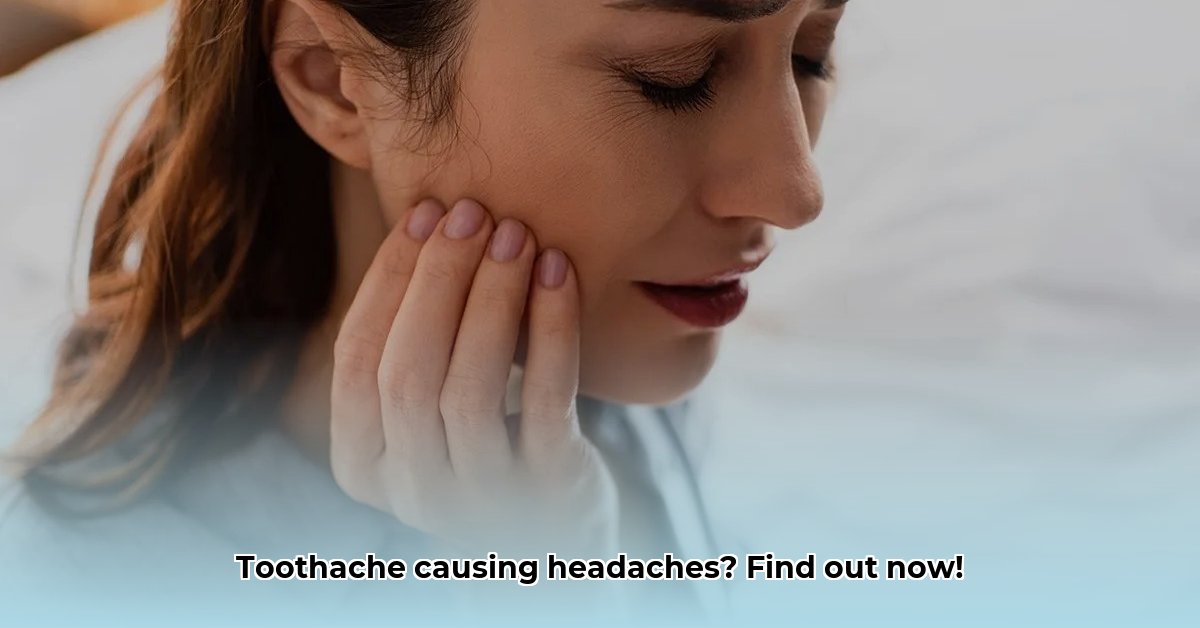The Surprising Link Between Toothaches and Headaches
Ever felt a throbbing toothache escalate into a full-blown headache? It’s not a coincidence. Toothaches and headaches often occur together, and understanding why can help you find relief. This article explores the connection between these two painful conditions, offering insights into causes, symptoms, and solutions.
Why a Toothache Can Lead to a Headache: The Trigeminal Nerve
The key player in this pain puzzle is often the trigeminal nerve. This large nerve relays sensations from your face, jaw, and teeth to your brain. When a tooth is damaged or infected, the trigeminal nerve can transmit pain signals that your brain may interpret as originating in your head, leading to a headache. This phenomenon, known as referred pain, explains why a problem in your mouth can cause pain felt elsewhere in your head.
Beyond Referred Pain: Other Potential Culprits
While the trigeminal nerve plays a significant role, other factors can contribute to the toothache-headache duo:
- Bruxism (Teeth Grinding): Clenching or grinding your teeth, especially at night, can strain jaw muscles, leading to tension headaches that may accompany a toothache.
- Infections: A tooth infection, such as an abscess, can cause inflammation and pressure that irritate surrounding tissues and nerves, triggering headaches. This requires prompt dental attention.
- Sinus Issues: Sinus infections, located near your upper teeth, can cause pain that mimics a toothache and often presents with headaches. The proximity of sinuses to teeth can create a double dose of discomfort.
- TMJ Disorders: Problems with the temporomandibular joint (TMJ), the hinge connecting your jaw to your skull, can lead to pain radiating to the teeth and head.
Less Common, More Serious Considerations
- Trigeminal Neuralgia: This nerve disorder causes intense, stabbing facial pain, sometimes mistaken for a toothache, and may be accompanied by headaches.
- Cavernous Sinus Thrombosis: A rare but serious complication of untreated dental infections. This involves a blood clot formation near the base of the skull, causing severe headaches and other symptoms. Seek immediate medical attention if suspected.
Recognizing When It’s More Than Just a Toothache
If a headache accompanies your toothache, watch for these additional symptoms:
- Pain concentrated on one side: This suggests a localized issue.
- Jaw stiffness or pain: Could indicate TMJ problems or bruxism.
- Ear fullness or pain: Possibly related to TMJ disorders or infections.
- Fever: A sign of infection requiring prompt attention.
- Swelling: Indicates localized inflammation and potential infection.
- Tooth sensitivity: May suggest cavities or other dental issues.
- Bad breath: Could point to an infection.
- Difficulty opening/closing your mouth: A sign of TMJ problems.
Finding Relief: A Practical Guide
-
See a Dentist: Crucial for diagnosing the underlying cause of your toothache and receiving appropriate treatment.
-
Over-the-Counter Pain Relief: Ibuprofen or naproxen can temporarily manage pain and inflammation.
-
Cold Compresses: Applying a cold compress to your jaw can reduce swelling and provide temporary relief.
-
Seek Immediate Medical Attention: If symptoms are severe, accompanied by fever, or if you suspect a serious complication, seek immediate medical care.
| Potential Cause | Symptoms | Recommended Action |
|---|---|---|
| Toothache-Related Headache | Headache concentrated around affected side of face/jaw | See a dentist |
| Bruxism | Tension headache, jaw pain | Dentist, stress reduction |
| Infection | Throbbing pain, fever, swelling | Immediate dental care |
| Sinus Infection | Sinus pressure, headache, possible toothache | See a doctor |
| TMJ Disorder | Jaw pain, clicking/popping jaw, headache | Dentist or oral surgeon |
| Trigeminal Neuralgia | Severe, stabbing facial pain, possible headache | See a neurologist |
| Cavernous Sinus Thrombosis | Severe headache, fever, vision changes, neurological symptoms | Immediate medical attention |
Important Note: This information is for general knowledge and does not replace professional medical advice. Always consult a healthcare provider or dentist for accurate diagnosis and personalized treatment.
Understanding the Nuances: Exploring Different Perspectives
While the connections between toothaches and headaches are often clear, it’s important to acknowledge the complexities involved. Research in this area is ongoing, and our understanding continues to evolve. Some experts suggest that certain types of headaches may be more directly linked to dental problems than others.
For example, while tension headaches are commonly associated with bruxism, the relationship between migraines and dental issues is less clear. While some individuals report that their migraines are triggered or worsened by toothaches, more research is needed to fully understand this connection.
It’s also important to consider that individual experiences can vary significantly. What triggers a headache in one person may not have the same effect in another. This is why a thorough evaluation by a healthcare professional is crucial for determining the specific cause of your pain and developing an appropriate treatment plan.
The information presented here should not be considered medical advice. It’s always best to consult with a healthcare professional for any health concerns. They can help you navigate the complexities of toothaches, headaches, and their potential connections, ensuring you receive the best possible care.
- Stainless Steel Food Storage for Healthier, Eco-Friendly Meal Prep - February 27, 2026
- Stainless Food Containers Offer Durable Storage for Everyday Meals - February 26, 2026
- Stainless Steel Containers Offer Superior Food Preservation and Durability - February 25, 2026










